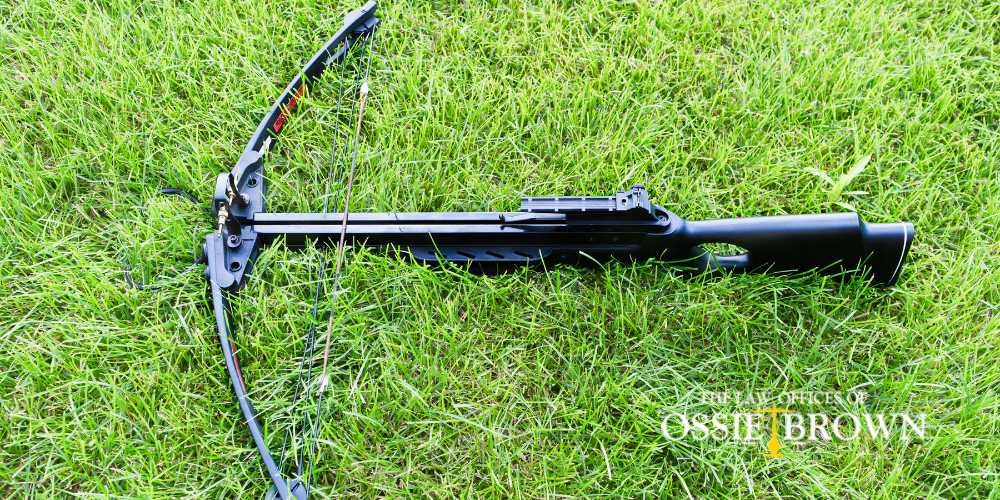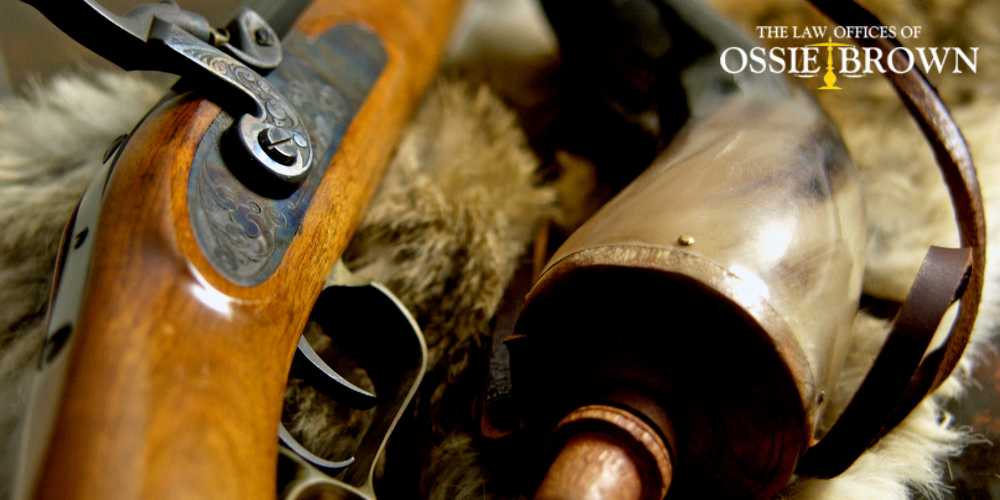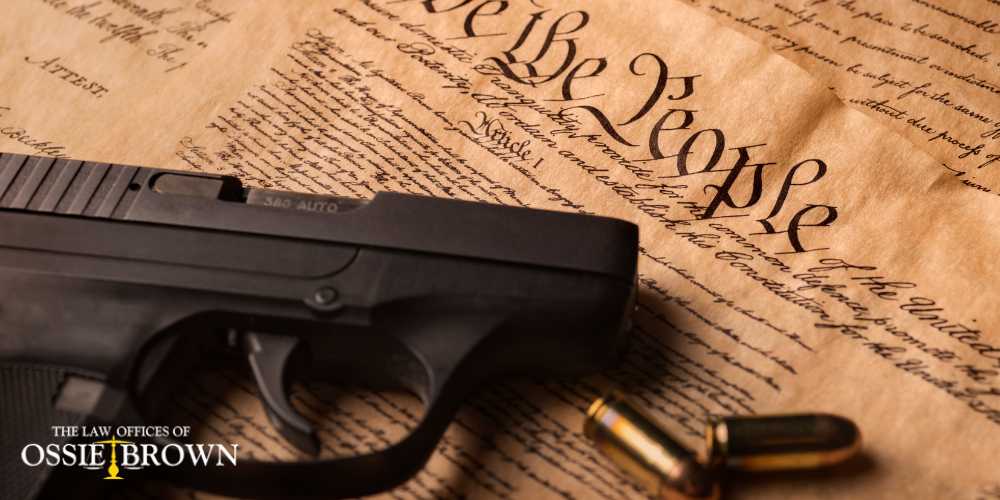Can a felon own a gun in Louisiana? The answer to this question depends on various factors, including the nature of the felony conviction and the specifics of Louisiana state and federal law. Under federal law, individuals with certain felony convictions are prohibited from owning or possessing a firearm. However, a person convicted previously of a felony offense may have their gun rights restored if the felon’s civil rights are reinstated after completing their prison sentence. Louisiana state law also restricts most felons from possessing guns, with violations considered a crime punishable by law.
Understanding the nuances of Louisiana state and federal law regarding felons and firearms is crucial. If you’re a convicted felon facing charges related to the possession of a firearm under federal law or Louisiana state law, seeking legal counsel from a knowledgeable Baton Rouge criminal defense lawyer at the Law Office of Ossie Brown can help protect your rights and explore your legal options under the Second Amendment rights and Louisiana gun laws.
Contact the Law Offices of Ossie Brown to schedule a consultation. Our Baton Rouge criminal defense attorneys can help you better understand owning a firearm under Federal law and Louisiana law and help protect your civil rights. Call (225) 343-1111 or complete our online intake form.
What Weapons Can a Felon Own in Louisiana?
Any person convicted of a felony offense faces restrictions on owning or possessing a firearm. Under federal gun laws, most felons cannot possess a firearm, with the exception of owning an antique firearm. Contact a Baton Rouge federal defense attorney to learn more.
A few states have different state laws regarding certain felonies and possessing guns.
Louisiana state law allows individuals previously convicted of a non-violent crime to possess antique firearms, black powder substitute, or black powder firearms under certain circumstances. Antique firearms are exempt from the federal rule, but it’s crucial for felons to be aware of Louisiana law. Consulting with a knowledgeable criminal defense attorney can provide clarity on the specific laws governing the possession of a firearm under federal law and state law.
Can a Felon Own a Crossbow in Louisiana?

In Louisiana, individuals with prior felony convictions can legally own crossbows. Crossbows are not typically subject to the same regulations that limit a felon’s ability to possess a firearm. Therefore, a convicted felon in Louisiana is generally permitted to possess and use crossbows without criminal penalties. However, it’s recommended for anyone with a felony offense on their record to verify with a local police officer or criminal defense attorney to ensure compliance with state law and federal law.
Can a Felon Own a Muzzleloader in Louisiana?
In Louisiana, a convicted felon can own muzzleloaders. These are also known as black powder or black powder substitute firearms and are typically exempt from the regulations that restrict those who are convicted of a felony from owning modern guns under federal law.
Can a Felon Own a BB Gun in Louisiana?
In Louisiana, individuals convicted previously of a felony offense are typically allowed to own BB guns since these are not classified under federal law. However, individuals previously convicted of a felony should verify with local authorities to ensure compliance with any specific regulations in their area.
Can a Felon Ever Own a Firearm in Louisiana?
Under federal law, individuals who have been convicted of non-violent felonies may have their civil rights restored under certain circumstances. Depending on the jurisdiction and the nature of the felony conviction, some felons whose convictions were not deemed violent may regain the right to possess firearms after fulfilling specific conditions, such as completing their prison sentence, probation, or having their civil rights restored through a legal pardon process.

Can a Convicted Felon Own a Gun in Louisiana?
In Louisiana, individuals guilty of a felony offense face restrictions on their right to gun rights under state law. Generally, convicted felons are prohibited from possessing firearms in Louisiana. However, depending on the nature of the felony and the individual’s legal circumstances, there may be exceptions or avenues for restoring firearm rights. It’s advisable for convicted felons in Louisiana to thoroughly understand the laws regarding gun possession and to seek legal guidance to navigate any avenues for restoring their gun rights.
State and Federal Law for Convicted Felons and Gun Possession
In Louisiana, both state and federal laws restrict convicted felons from possessing firearms. Under federal law, a convicted felon is generally not allowed to possess firearms to ensure public safety. Louisiana state law aligns with these federal laws, imposing similar restrictions on convicted felons regarding firearm possession.
While some non-violent felons can potentially have their gun rights restored under certain conditions, they must still navigate the stringent regulations outlined by both state and federal authorities. Given the complexities surrounding firearm possession for a convicted felon, seeking legal advice from a Baton Rouge criminal defense attorney is essential to understand the specific implications of these laws.
Federal Gun Laws
Federal gun laws are primarily governed by the Constitution, which protects individuals’ gun rights. However, there are other applicable federal laws associated with possessing a firearm.

Second Amendment
This amendment guarantees the right of American citizens to keep and bear arms.
“A well regulated Militia, being necessary to the security of a free State, the right of the people to keep and bear Arms, shall not be infringed.”
Over time, various court rulings, including those by the Supreme Court, have shaped the understanding of the Second Amendment, affirming an individual’s right to own firearms while also allowing for reasonable regulations by government authorities to promote public safety.
Gun Control Act of 1968
The Gun Control Act of 1968 is a significant federal law that regulates the firearms industry. Enacted in response to high-profile assassinations, the Gun Control Act established the Federal Firearms License system and imposed restrictions on firearm sales, limiting the abilities of felons and those with mental health issues to purchase or possess firearms. The Gun Control Act also regulates firearm importation, manufacture, and sales, sets age requirements, and mandates background checks for purchases from licensed dealers.
Lautenberg Amendment
The Lautenberg Amendment is a key addition to U.S. federal law regarding firearms, as it limits the ability of domestic violence offenders to own or possess a firearm. This amendment was enacted to address concerns about domestic violence-related gun violence and to enhance the safety of victims.
If you’ve been accused of domestic violence, our Baton Rouge domestic violence lawyer team can help to ensure your legal rights are upheld.
Louisiana Law for Felon in Possession of a Firearm
Under Louisiana law, the unlawful possession of a firearm by a felon carries severe criminal penalties. Both actual or constructive possession, where the firearm is within reach or control of the individual, are considered illegal. While some non-violent felons may have their gun rights restored, a person convicted previously must legally possess a firearm, adhering to a waiting period and other regulations.
It’s crucial for convicted felons in Louisiana to understand the specific laws surrounding firearm possession and seek assistance from a criminal defense attorney in Baton Rouge.
Constructive Possession in Louisiana
In Louisiana, constructive possession pertains to situations where individuals have the ability and intent to exercise control over an item, such as a firearm, even if it’s not physically on their person. For those with prior felony convictions, gun possession, whether active or constructive possession, is a crime punishable under Louisiana law. This means that if a firearm is found in a location where a felon resides, they could be charged with constructive possession. Even if the firearm belongs to a family member or was left there via unauthorized entry, the felon may still face criminal penalties.
In Louisiana, being a person convicted of a felony and then found in constructive possession of a firearm is considered a serious crime, with potential consequences including significant fines and lengthy prison sentences. Understanding the implications of constructive possession under Louisiana law is crucial for individuals convicted of certain felonies to avoid unintentionally violating firearms regulations and facing further legal repercussions.
How to Restore Gun Rights After a Felony Conviction in Louisiana
In Louisiana, most felons face stringent restrictions on regaining their firearm rights after a conviction. Individuals with a suspended sentence or those who have completed their sentence often face a waiting period before they can apply for restoration of their gun rights. The process typically involves petitioning the court for a pardon or expungement, which requires demonstrating rehabilitation and a commitment to living lawfully.
However, for individuals convicted of certain serious crimes, such as crimes defined under Louisiana law as “delayed action incendiary device” offenses or other criminal charges punishable by imprisonment for more than one year, restoring gun rights may be significantly more challenging, if not impossible.
Felon’s Civil Rights Restoration
The process to restore a felon’s civil rights involves petitioning the court for a pardon or expungement. This requires demonstrating rehabilitation and a commitment to living lawfully. For individuals with a suspended sentence or those who have completed their sentence, there may be a waiting period before they can apply for restoration.
For those convicted of serious crimes, such as offenses involving delayed action incendiary devices or criminal charges punishable by imprisonment for more than one year, the process may be more challenging. Therefore it is advisable for convicted individuals in Louisiana wising to regain their rights seek counsel from a legal professional.


